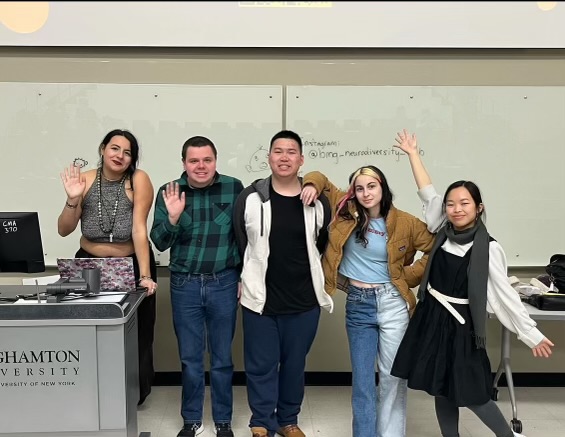The Neurodiversity Club (NDC), founded at Binghamton University in 2022, strives to foster an inclusive environment for all individuals.
Upon recognizing a lack of space for neurodivergent students on campus, Kimberly Mourao, NDC’s president and a senior double-majoring in psychology and philosophy, politics and law, and Brian Flynn, the organization’s vice president and a first-year graduate student studying biomedical engineering, came up with the idea for the organization in spring 2022. With the help of the current E-Board, they began forming the club. Meetings are weekly on Monday nights, where they host group activities like tote bag painting, board game nights, bracelet making and fundraisers.
“This essentially is really designed to get people to interact with or do different things and just help break the ice up to discuss as people because we know that [neurodiverse students with] autism, [attention deficit hyperactivity disorder (ADHD)], dyslexia [and obsessive compulsive disorder (OCD)] have a harder time socializing and making friends,” Flynn said. “Like-minded people can find each other and be able to engage in fun activities.”
Neurodivergent students make up anywhere from 11-30 percent of undergraduate populations in the United States. It can be especially difficult for undiagnosed students to receive a diagnosis during adulthood because most insurance companies will not cover evaluations for those over 18, Flynn explained. This is why NDC often collaborates with Services for Students with Disabilities (SSD) to cater to the needs of the different individuals in their organization. The E-Board attends a biweekly roundtable to voice concerns along with SSD, the Disabled Student Union (DSU) and the American Sign Language (ASL) Club.
“Firstly, I always wanted it known that diagnosis is not a barrier for being part of NDC,” Mourao wrote. “I know very well that there is a culture of gatekeeping neurodiversity from people who don’t have a diagnosis, but oftentimes diagnosis is a barrier in [and] of itself. So, NDC is a safe place for people who are diagnosed, self-diagnosed or questioning.”
She added that neurodiversity encompasses a wide range of people, including those with anxiety and depression, which may lead them to be less likely to seek a community and that since the club’s founding, they have received a great amount of support from both the University and the Student Association. Mourao emphasized the relationship between neurodivergence, disability and mental health, and doing their part in creating a safe space for those in crisis.
Jubilation Yeh, one of NDC’s event coordinators and a sophomore double-majoring in chemistry and environmental science, described the organization’s shift to spotlight neurodivergent people across multiple fields this semester. They are hoping to host multiple panels to highlight disability in the workplace and promote a community of neurodivergent people beyond adolescence.
“It’s great that we can be there for students, but it’s also a bit disheartening that it’s not so common across universities,” Yeh said. “I feel especially because of the subject matter of our club, it gives us a lot of flexibility. Especially because neurodiversity is something that can transcend your race, your gender, your sexuality [and] your economic class.”
Ryan Hsie, the social media manager and treasurer of NDC and a sophomore majoring in biochemistry, said that E-Board meetings will soon be opening up to the public to create transparency around planning and coordinating events, as well as to encourage general members to become more involved. They encourage those who attend their meetings to suggest ideas for events, assuring there’s “something for everyone.”
“We want to make sure that everyone will enjoy coming to our meetings,” Hsie wrote. “We want to also make sure that we create a space where nobody is judged, so people will feel more comfortable just being themselves with us.”



